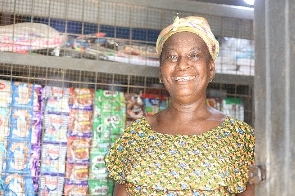Over 1,200 petty traders have received helpful business tips at a financial wellness training aimed at equipping them with the necessary finance and accounting knowledge to keep their businesses afloat.
The petty traders from Asutsuare, Juapong, and Torgormey left the sessions with practical knowledge on how to make, spend and save money while sustaining and growing their small businesses. Trainer Nicholas Ross, a Senior Executive Director of KAST Consult, told them to think big but start small. “Don’t rent a kiosk of 200 cedis when your capital is only 500 cedis”.
Faustina Kidi Gaku already follows this advice. She runs a small shop in a small village that lives mainly in agriculture, pottery, and fishing. Nevertheless, she has learned a lot in training.
A little over 30 years ago, Faustina married a teacher and moved to Togormey after she completed her middle school education. Without any capital, Faustina dreamt of trading. She capitalized on farmers in Togormey who had no market to sell their cassava. It was a win-win situation. For one year, she would credit the cassava, convert it into cassava dough, sell, pay back the farmers, and save some.
Within a year, she had saved 30 cedis. And that was the beginning of her small provision shop which she operates from her sitting room. This means she doesn’t pay rent. The deep freezer housing drinks and water sits in her bedroom. From 30 cedis capital, today she boasts of 30,000 and makes 2,500 profits monthly.
Faustina could be making more profit but being a mother of six, she is very softhearted. She often gives out items on credit and runs at a loss when the creditors fail to pay back. She has a new resolve and happily communicated it. She said, “After today’s session, I am going to stop giving out items on credit to some people.
From what I have been taught here, it doesn’t matter if they get angry. I cannot run my business aground because of them. Henceforth, anybody who takes an item from the shop must also pay back, including my husband to keep my capital intact.”
Mawuse Gidi, a hairdresser from Juapong was lucky to get capital reinjection from her husband even though she also started her business by herself 13 years ago, saving a little of what she was being paid working at a block factory. After seven years, she had saved 1,500 and got an additional 200 from her aunt.
With this money, she rented a room in Juapong, bought a container and her first dryer. Today, her salon is well stocked and running profitably. Mawuse says joining the financial wellness training is a good experience because “I have learnt here how to separate my account so that my capital is not mixing up with my profit and how important it is to save a little of my profit somewhere for a rainy day while using the majority to recapitalize my business in order to grow it. If I knew this 13 years ago, my business could be much bigger than it is today”.
The petty traders left the training with this caution from Nicholas Ross, “Don’t take a loan of 200 cedis with an interest of 100 cedis when your profit is 2 cedis a day. The interest can break your business because whether you sell or not, the interest will keep growing”.
The financial wellness sessions were organized under the COVID-19: Comprehensive Pandemic Management for Employees, Families, and Communities project where one of the project partners, Golden Exotics, operates from. The project is implemented by the Deutsche Gesellschaft für Internationale Zusammenarbeit (GIZ) GmbH on behalf of the German Federal Ministry for Economic Cooperation and Development and funded through the GIZ develoPPP programme.
Business News of Monday, 31 July 2023
Source: GIZ













